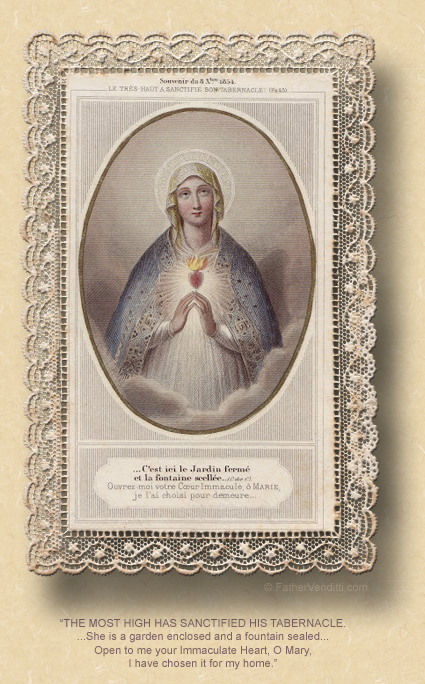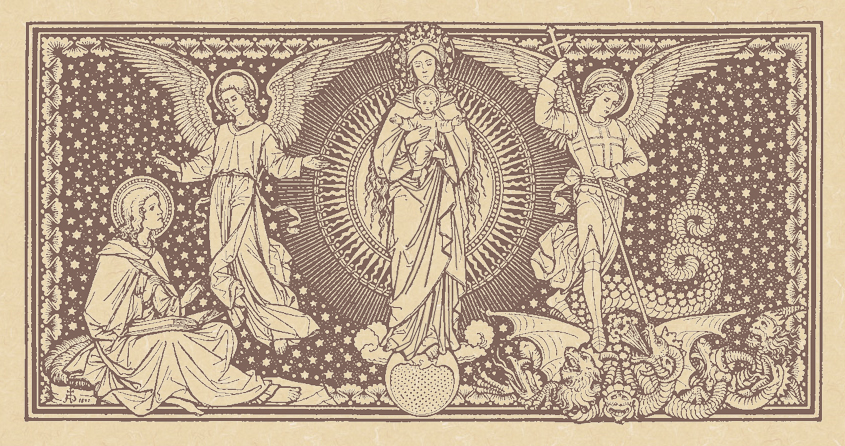Hurry Up and Wait.
The Memorial of Saint Francis Xavier, Priest.*
Lessons from the feria, according to the ordinary form of the Roman Rite:
• Isaiah 30: 19-21, 23-26.
• Psalm 147: 1-6.
• Matthew 9: 35—10: 1, 5-8.
|
…or, from the proper:
• I Corinthians 9: 16-19, 22-23.
• Psalm 117: 1-2.
• Mark 16: 15-20.
…or, any lessons from the common of Pastors for Missionaries.
|
The Third Class Feast of Saint Francis Xavier, Confessor; and, the Commemoration of the First Saturday of Advent.**
Lessons from the proper, according to the extraordinary form of the Roman Rite:
• Romans 10: 10-18.
• Psalm 91: 13-14.
• Mark 16: 15-18.
The Twenty-Eighth Saturday after Pentecost, the Third of Philip's Fast; and, the Feast of the Holy Prophet Zephaniah.***
Lessons from the pentecostarion, according to the Ruthenian recension of the Byzantine Rite:
• Ephesians 2: 11-13.
• Luke 12: 32-40.
FatherVenditti.com
|
 9:46 AM 12/3/2016 — The First Saturday of the month is so important to us here at the Shrine and, with all due respect to the great missionary, Saint Francis Xavier, whose memorial we observe today, our reflection today draws from today’s Gospel lesson to talk about our Five First Saturdays devotion and our practice of it. As usual, Holy Mass concludes with the Exposition of the Blessed Sacrament, during which we will pray together the Litany of the Immaculate Heart, with the rest of the Holy Hour yours to speak with our Eucharistic Lord, go to confession if you were not able before Mass, with Benediction at one-thirty. 9:46 AM 12/3/2016 — The First Saturday of the month is so important to us here at the Shrine and, with all due respect to the great missionary, Saint Francis Xavier, whose memorial we observe today, our reflection today draws from today’s Gospel lesson to talk about our Five First Saturdays devotion and our practice of it. As usual, Holy Mass concludes with the Exposition of the Blessed Sacrament, during which we will pray together the Litany of the Immaculate Heart, with the rest of the Holy Hour yours to speak with our Eucharistic Lord, go to confession if you were not able before Mass, with Benediction at one-thirty.
This will probably date me, but I was here at the Shrine when I first heard about the alleged apparitions of the Mother of God at Bayside, New York, which supposedly began in 1970 and continued right through 1995. Those pretended apparitions were, of course, a hoax, which was known early on when the local bishop correctly pointed out that the content of many of the messages was in direct conflict with fundamental Catholic teaching. I first heard about them here at the Shrine because I had run into a woman who was visiting here who had been running bus trips from New Jersey to Bayside on a monthly basis to be present at these apparitions which, supposedly, where occurring on a fixed schedule; and this was well after the Holy See had declared the apparitions fraudulent. But it started me thinking:—and I've pondered this many times over the years—what is it about some people that they feel they must grab onto any and every hint of supernatural phenomena that comes along, like a drowning man grabbing for a life preserver? And the only answer I can come up with is a complete and total lack of faith. Some people chase after apparitions because an apparition provides proof where faith has failed. One is reminded of the words of Our Lord: “Thou hast learned to believe, Thomas, because thou hast seen me. Blessed are those who have not seen, and yet have learned to believe” (John 20: 29 Knox).
I, for one, am very grateful that I was not around in 1917 to witness the Miracle of the Sun, because I would hate to believe that Our Lady would think that I would need to see it. I would much rather believe that my faith would not require any proof. Those of us who believe in the messages of Our Blessed Mother at Fatima do so not because we are faithless people searching for some sort of proof, but because of the timely content of those messages: we see the condition of our world, and understand the dire need for reparation; and, we count it a privilege to have been recruited by Our Blessed Mother to be a part of the solution, principally through our First Saturday observance of Confession, Mass and Holy Communion done in the spirit of reparation.
But, to make reparation, one has to believe in the first place. In fact, only a person of very strong faith can make reparation, because he or she is making up for the lack of faith in others.  That's what distinguishes a true apparition like Fatima from a false one: a true apparition comes to someone of faith who isn't looking for it, who doesn't necessarily want it, and who is awfully surprised when it happens. That's what distinguishes a true apparition like Fatima from a false one: a true apparition comes to someone of faith who isn't looking for it, who doesn't necessarily want it, and who is awfully surprised when it happens.
Today's Gospel lesson includes those words we so often associate with our prayers for—and fostering of—vocations to the Holy Priesthood. I like Msgr. Knox's translation: “The harvest is plentiful enough, but the labourers are few; you must ask the Lord to whom the harvest belongs to send labourers out for the harvesting” (Matt. 9: 37 Knox). But why does our Lord say these words to His disciples? Is it not because of what Saint Matthew tells us in just the previous verse: “At the sight of the crowds, his heart was moved with pity for them because they were troubled and abandoned, like sheep without a shepherd” (v. 36 NABRE)? Not to suggest that priestly vocations should not be constantly in our prayers, but in the context of today's Mass I would suggest that the harvest isn't simply souls who need priests, but souls who need faith, souls whose faith is so weak that they will follow after anyone or anything that promises to take all their doubts away in an instant. “Take care,” says our Lord, “that you do not allow anyone to deceive you. Many will come making use of my name; they will say, Here I am, the time is close at hand; do not turn aside after them” (Luke 21: 8 Knox). But people do, all the time. They are, just as our Lord observed during the time of His public ministry, like sheep without a shepherd, which is exactly what a Christian is who sets aside the guidance of Holy Mother Church in order to follow after some flap jack at I-Hop in which someone says you can see the face of Jesus.
Beáti omnes qui exspéctant Dóminum. The response for today's psalm: “Blessed are all who wait for the Lord” (cf. Isaiah 30: 18). That's what the person of faith does. He's not seeking, he's not looking, he's not chasing; he's waiting … waiting in faith for the Lord to do what he promised in our first lesson from Isaiah: “The Lord will give you the bread you need and the water for which you thirst. No longer will your Teacher hide himself, but with your own eyes you shall see your Teacher, while from behind, a voice shall sound in your ears: 'This is the way; walk in it…'” (Isaiah 30: 20-21 RM3). But when that day comes is not for us to know. The Prophet is quite clear: when that day comes it will be obvious; there will be no need for any of us to have been looking out for it. Our duty, as people of faith, is not to be sweeping the skies with a spiritual searchlight ready to crank the siren at the first sign of the apocalypse. Our duty, as people of a sure and certain faith, is to live out the duties of our state in life, with a soul purified by penance and sacramental grace, and a heart clear and calm in the surety of our Lord's love and mercy.

* One of the first companions of Ignatius Loyola, Francis Xavier became one of the greatest missionaries of all time, preaching the Gospel and converting thousands in India and Japan. He died in 1552 on route to China.
** In the extraordinary form during Advent, whenever a feast is observed, the feria is commemorated, but a Mass is not permitted for this commemoration; rather, the commemoration is made at Mass by an additional Collect, Secret and Postcommunion added to those of the feast. The commemoration is made at Lauds and Vespers by adding an additional antiphon, verse and Collect to those of the feast.
*** Cf. the first paragraph of the first footnote attached to the post here for an explanation of Philip's Fast. Today is the third Saturday because the season began on a Tuesday.
Zephaniah lived towards the end of the seventh century BC, and his writings in the Scriptures focus on the same topics as his contemporaires, Nahum and Habakkuk: the destruction of the Temple, the fall of Jerusalem, the conversion of the Gentiles, the perdition of sinners, the glorification of the saints, and the general judgment.
|

